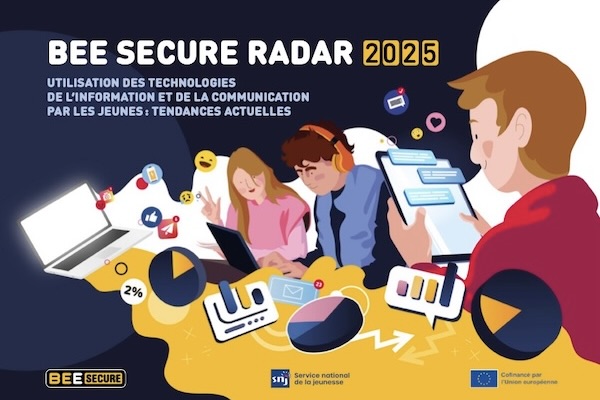
On Tuesday 11 February 2025, to coincide with World Safer Internet Day, the National Youth Service of Luxembourg (Service National de la Jeunesse - SNJ) published the fourth edition of the BEE SECURE Radar report.
The report, which looks at current trends in the use of information and communication technologies (ICT) by young people in Luxembourg and monitors developments in the field of ICT use and associated risks, documents the observations and the results of various surveys carried out by the BEE SECURE initiative as part of its activities for the 2023-2024 school year. It includes, in particular, feedback from children, young people and parents of children as well as teachers and educational staff on various issues related to safe and responsible use of the Internet.
According to a survey of more than 14,000 students aged eight to eighteen, Snapchat, WhatsApp and Instagram remain the most popular apps within this age group. This trend is virtually unchanged compared to the previous year (primary education: WhatsApp (53%), Snapchat (37%) and TikTok (22%); secondary education: Snapchat (74%), WhatsApp (67%) and Instagram (47%)).
Almost all respondents, regardless of their category, stated that they are aware of the feature of smartphones which allows them to display screen time, yet many find it difficult to set limits on their smartphone use. Around 50% to 70% of young people surveyed indicated that they picked up their smartphone several times per hour. The majority of respondents, including young people surveyed about their own use, believe that young people use their smartphones too often (54% of twelve- to sixteen-year-olds, 79% of seventeen- to 30-year-olds, and 90% of teachers). Excessive use of smartphones remains the main concern of parents and teachers.
Adults, especially parents, teachers and young adults aged seventeen to 30, express concerns mainly related to screen time, misinformation, age-inappropriate content, data protection, influencers and cyberbullying. Among twelve- to sixteen-year-olds, cyberbullying and sexual content are the most frequently cited concerns. Most parents and young people over eighteen agree that access to content that is inappropriate for under-eighteens should be subject to age verification. Amongst adolescents aged twelve to seventeen the majority mostly agree (37%) or strongly agree (32%) with this statement.
Of the 72 calls in the field of children and young people, sextortion (blackmail with nude photos) was, as in the previous year, the most frequently discussed topic by young people on the BEE SECURE Helpline. Cybercrime (including fraud, hacking and phishing) was the second most mentioned topic by young people themselves.
For the first time, the BEE SECURE Radar survey addressed the issue of artificial intelligence (AI) in order to capture trends in perception by young people and adults. The results show that AI is perceived ambivalently, as both an opportunity, a danger or a combination of both. For themselves, the majority of people see AI as an opportunity rather than a danger. In contrast to the personal assessment of AI, the perception of its impact on society as a whole tends to lean more towards danger.
For 2025 a new focus has been placed on the issues of information, information sources and their credibility. The Zentrum fir politesch Bildung (ZpB) foundation has analysed the answers to questions about information sources and how to check their credibility. Based on this analysis, it formulates suggestions on topics that should be given priority in media education. Overall, it emerged that media education remains essential for all age groups.
In order to raise awareness and support both young and old people, BEE SECURE has launched the campaign "Een Af mécht der Honnert" which focuses on deep fakes, disinformation and artificial intelligence. These awareness-raising efforts are fully in line with the action plan "sécher.digital" launched by Luxembourg’s Minister of Education, Children and Youth, Claude Meisch. One of the objectives of this action plan is to ensure that all children, young people and their loved ones, both at home and at school, can adopt a healthy, balanced and safe use of smartphones and the digital world.
In line with the slogan of World Safer Internet Day, “Together for a better Internet", the BEE SECURE Radar aims to “inform all stakeholders involved in promoting safer use of the Internet for children and young people and to help them guide their actions in a targeted manner. Everyone can contribute to helping children find their way in life and in the (digital) world of today and tomorrow.”
SM








